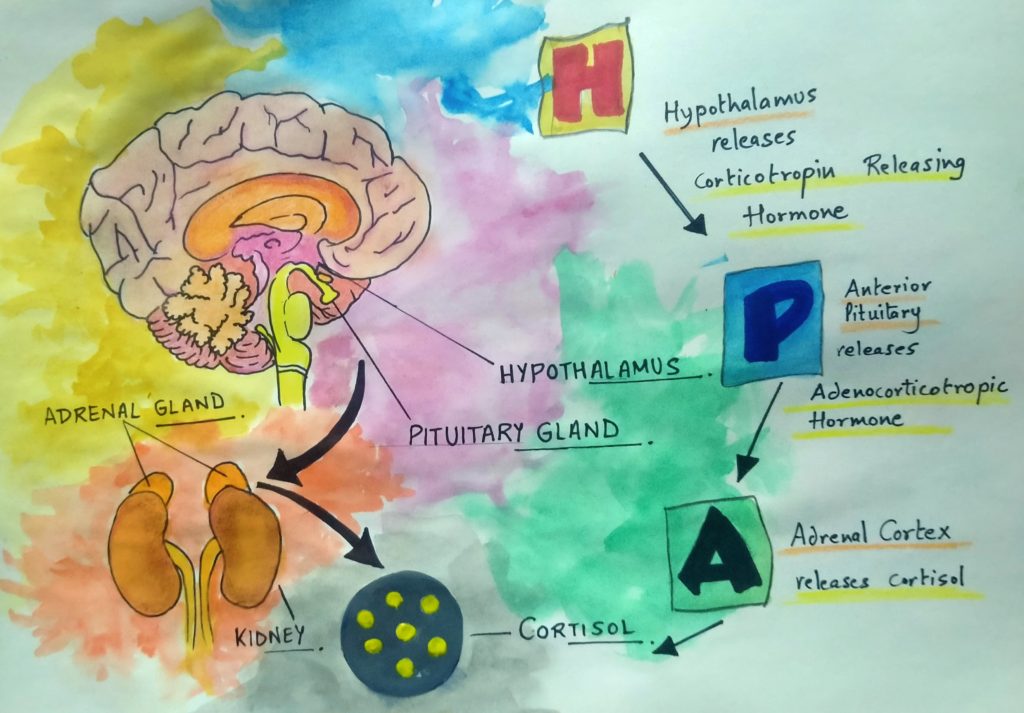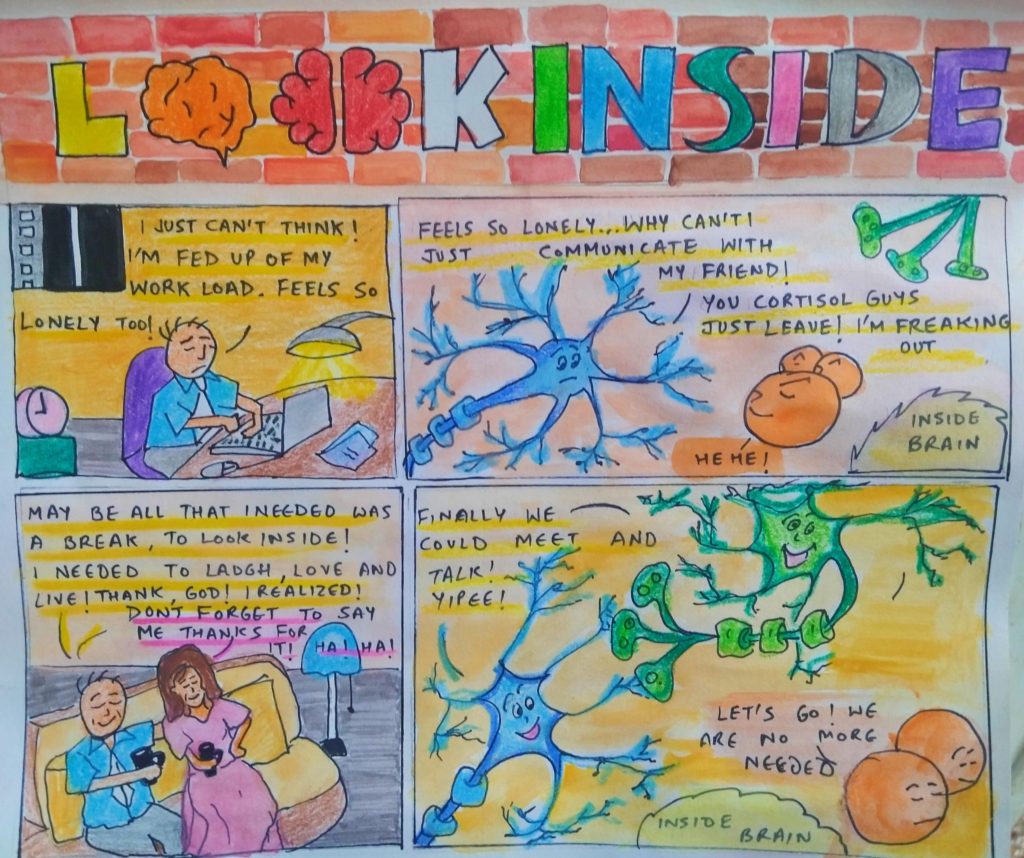Not being able to find just the right words to start this article makes me stressed. Studying for exams makes me stressed. Thinking about the impending doom Covid has left on this planet makes us all stressed. It’s such things in life that make us feel anxious, stressed and fearful. But did you ever wonder if you weren’t so stressed at that moment what might be the outcome?
People will always say “stop being stressed out” or “try to chill out sometimes” but does that always work for our minds and is it good for the body? Through this article, I hope that this professional quack might be able to help everyone understand how good and bad stress is. Well to begin, a clear description of the centres of stress is a must to understand the process. The HPA axis aka stress regulating system of the body has got the lead role. The hypothalamic-pituitary-adrenal axis releases hormones in our body that help the body fight off stress.
Let’s start with the axis first. The hypothalamus releases a hormone called cortico-tropin releasing another hormone aka “the boss” that makes the pituitary release another hormone called the adrenocorticotropic hormone (Wow! Isn’t that a mouthful?). Then this hormone goes on to stimulate the adrenal glands, which are basically kidney caps, to release cortisol, epinephrine (adrenaline) and norepinephrine. And these are the stress hormones that basically primarily are like the programming function to how our body responds to stress. Phew! Now, this cortisol causes the release of more glucose into our body to be utilised to help the body cope, e.g. run away from a bear or rat, or stay up late at nights or win a marathon! Basically, this is the ‘fight or flight mechanism.

But if this is helping our bodies to do the needful then what’s the harm? No harm, no foul! But hold on, I forgot to let you in on a secret. This is only happening once. I’m only writing this article once. But what happens when I have to write more? Well, I will go through the same process again and again and that’s where the problem begins. It’s true what they say, anything in excess is always bad!
Fun fact — this is always happening in your body day in and day out! If you are probably wondering why you can’t get up early in the morning, that’s probably low cortisol!
Acute stress symptoms can vary from difficulty in breathing, to loss of appetite to nausea, to those hard to get rid of acne, to all those brushes filled with hair, to headaches, to muscle strains and to even chest pain. Ever wonder why you fall sick before an exam? That’s stress.
The adrenaline released stimulates your heart to beat faster (not going into detail) and that leads to hypertension.
Ever wonder where those butterflies come from in your stomach? Oh yeah, that’s stress and in the long run, that leads to us taking antacids.
Since we are talking about the gut, let’s talk about the cheat days that we need! Cortisol increases our appetite so much that it makes us reach for the ice cream hidden at the back of the freezer or make us crave those buckets of fried chicken (and other vegetarian/vegan options).
So let’s take a typical day as an example. I wake up in the morning and my cortisol is high! I’m refreshed and ready to take on any problem. Suddenly, I get a notice, a message on my phone,” Exams will take place next week offline!!” STRESS. I sit to study and realise I’m doing well. I can make a schedule and if I stick to it it will be possible to pass the exam. But then I remember, “Pandemic!!” “What if I get infected?!” “What if I can’t appear for the exam!” “What if I fail?!”. MORE STRESS. Now slowly my brain is shutting down. But I think to myself that that’s okay and I’ll just power through. In the evening, my pet falls sick and we have to rush him to the vet! STRESS. But wait, I have to complete this article before the deadline! STRESS. And let’s not forget, thinking about the future, MAJOR STRESS. But this does not even begin to cover the actual amount of times our body goes through stress. This is only psychological stress but what about the physical? By night time my brain and body are so weary of the stress waves and, the cortisol is so low that I just crash. And this is not just one day, but almost every day. Especially with the pandemic, everyone’s stress keeps getting worse at some point.

If I go on like that with multiple stress waves with no check on them, surely my brain will “crash” at any time! Well, what does that mean?
Our bodies have mechanisms to help our body deal with “fight or flight” but with the advancing times our body has to deal with such situations not once but many times throughout the day. This is what causes a negative effect also known as chronic stress.
This is where our body is under continuous stress due to high levels of cortisol in the body that fails to provide negative feedback to the hypothalamus to stop the release of CRH. Therefore, there are continuously high amounts of cortisol present in your body which in turn affects the amygdala and, the fear centre, stimulating, and stimulates more neural action there. It also affects the hippocampus (not shaped like a hippopotamus) that basically affects your learning abilities and very importantly, it inhibits HPA; thus you are less likely to control and regulate stress. Stressful right!

Another very scary fact- excess cortisol leads to brain shrinkage (mostly the prefrontal cortex that affects decision making, social abilities and learning). Less new neurons are produced and a loss of synaptic connections is seen.
Chronic stress is a problem when you realise you are forgetting things, can’t memorise small things easily, it is very difficult for you to concentrate, less sleep, irritability, mood swings, susceptibility to infection, chest pain, stomach aches, poor eating habits, feeling of loneliness, depression, and anxiety attacks. This can only transcend to Alzheimer’s and severe depression as we grow old. So basically, in short, the brain grows smaller as we grow older!
The excess cortisol also inhibits proper endothelial function causing atherosclerosis in the long run. And you know what that leads to. Hint, hint—- not a long life. So now that we have established the side effects it’s safe to say- STRESS KILLS!
But this is not the end nor the beginning. This stress mechanism has been passed on from generations and probably will continue to do so if stress is not kept in check. People can become less sensitive to stress if they are brought up in nurturing homes (mostly stress-free) and this behaviour is passed on to many generations also known as epigenetic changes. Stress affects how the genes are expressed without actually changing the genetic code.
So if you’re stressed out many times a day you know what the probable cause is and who to blame!
But to every problem, there’s a solution! Yes, there is a way to reverse all this madness. And yes it’s yoga, exercise, meditation and all the good stuff that we see in every post, and articles in this pandemic, that all of us want to do and should be doing, but don’t find the time or the patience. So I don’t need to tell you what to do, but does that mean you will let stress override your life?
A note to all those out there who are just reading this article and then continuing their normal(stressful) life without caring about the future and its consequences:-Don’t think about them now, think about the future. And by this, I don’t mean 20 years from now, but the next hour, the next day. Is the stress you feel at this moment worth the headache you will get for the next few days? Or the stomach pains that prevent you from eating all the food you love? Of course, the answer is a big no.
Everyone wants to be happy and for that, you need to do what makes you happy! Take a stroll, cook food, wear makeup, throw some paint, listen to music, dance around, write articles, talk to people, read a book, and if nothing works you can even just stare out of your window for a few minutes but it will definitely help to KILL STRESS!
Writer

Aditi Kulkarni
Aditi Kulkarni is currently pursuing her undergrad degree in MBBS in Smt. Kashibai Navale Medical College. A second-year student who has a long way to go to become a good doctor has an eclectic taste in music and is a firm follower of David Attenborough. She stands true to her belief in “Dogs over Humans” any day.
Illustrator

Yamini Kathuria
An amateur artist and an avid reader, currently pursuing a bachelor’s degree in Psychology at Delhi University. Intrigued by our experiences, from human consciousness to the complexity of nature, she wishes to work in an interdisciplinary area where cognitive science, psychology & neuroscience meet. Her love for connecting & sharing knowledge with others makes her feel happy & content, a reason to work for ‘The Science Paradox’ magazine.

Aditi Kulkarni has always been an outstanding student in St.Mary’s school . I have been her teacher and recognized that this child is going to achieve greater things inside. The article she has written speaks volumes about her . Aditi ,I’m amazed by this article you have penned and I wish her all the blessings, she would be a promising future doctor to the people she will be serving soon .God bless her .
Thanks you Mrs.Samson for all your blessings and kind wishes!! I’m so grateful for your support and guidance.
Woow. I didn’t know all this goes inside my body when i am stressed. Great article Aditi, and nice illustrations Yamini.
Great job in adding few jokes in the article. It was fun to read it.
Thank you Varun uncle for your kind words!
How deeply insightful Aditi! Didn’t realise we were subjecting our own neurological system to the brink of dreadful Alzheimer’s.
Thank you for sharing this knowledge in the simplest way for us.
Really appreciate your support Asma aunty!! 😊
Thank you varun uncle!! 😊
So true… finding your way to overcome stress is important. Stress is a part of our every day life. How to overcome and stay positive is within each one.
Eye opener… to know what goes inside our body
Great 👍 work guys
Thank you so much for your insight Shilpa maushi!!
Good read! It is very important to understand our mind and body especially in these times.
Keep it up Aditi.
Absolutely Nadia aunty! I’m so glad that you enjoyed reading this article! 😊
Thanks for this!! Now I exactly know why my body acts weird before exams :”) Great work Aditi!!! Reading this made me aware of my own body which was much needed in this covid period.
Nicely penned Aditi!! Liked the way you explained in a simple way ( minus the medical terms 🙂 ). Keep up the good work, way to go.